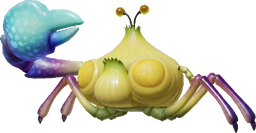Aristocrab Offspring
| |||
|---|---|---|---|

| |||
| Appears in | Pikmin 4 | ||
| Scientific name | Brachyurices esurio (hatchling) | ||
| Family | Onionshell | ||
| Areas | Serene Shores (Story Mode and Olimar's Shipwreck Tale) | ||
| Caves | Seafloor Resort, The Mud Pit | ||
| Dandori Challenge stages | Test Tubs, Planning Pools | ||
| Dandori Battle stages | Dandori Castle | ||
| Attacks | Eat Pikmin, shoot bubbles | ||
The Aristocrab Offspring (カニンコ?, lit.: "Crab Offspring") is an enemy in Pikmin 4. As the name implies, they are a smaller and younger version of the Peckish Aristocrab. They share many of the same traits, like sidestepping, blowing bubbles, and using their enlarged claw to attack. One unique trait to the hatchlings is that they can sometimes hide underground to surprise their enemies.
Stats
| Weight | Max. carriers |
Seeds | Value | Health |
|---|---|---|---|---|
| 3 | 6 | 4 | 450 |
Behavior
The Aristocrab Offspring acts similarly to his adult counterpart, but is overall much weaker. If a Pikmin comes near it, it will either try to catch it with his claw or shoot bubbles from his mouth to trap it. After a Pikmin is attached to it for roughly 5 seconds, it will shake them off; however, unlike the Peckish Aristocrab, they're not able to stand up when being charged at.
A behavior unique to the Aristocrab Offspring is being able to hide themselves underground; if a Pikmin comes close to an hiding Aristocrab, it will come out and start behaving like normal.
Appearance
Their appearance is nearly identical to the adult Peckish Aristocrabs, only smaller.
Locations
Strategy
|
The following article or section contains guides. |
With its low health and overall relatively low threat level, these offsprings are quite easy to deal with. You can simply use Oatchi to charge at it with a squad of Pikmin and that should finish it off pretty quickly. Unlike the Peckish Aristocrab, the offsprings cannot avoid a charge by simply standing tall and then coming back down, so charging them is quite effective at destroying them.
Notes
Dalmo's notes
Olimar's notes
“A juvenile Peckish Aristocrab. Small in size, its right pincer is only half grown. Because of this, it often hunts by hiding underground and lying in wait to ambush its prey.
Generally, crabs pass through the larval stages zoea and megalopa as they approach juvenile crabhood. Instead, the Peckish Aristocrab is born with a body shaped like an onion, absorbing its nutrition through the ground and sprouting legs as it grows. Perhaps it's a close relative of species in the Ambuloradicis class.”Louie's notes
Pikmin Garden
Text
“カニタマの稚ガニ。成体より殻がやわらかく、鳥などの外敵に襲われるのを防ぐため、地中に隠れて獲物を待ち伏せることが多い。
特徴 その1 地中に隠れる
- 地中に隠れて、獲物を待つ。
- (Image text: 勢いよく飛び出し、捕食する)
特徴 その2 カニタマの成長
- 幼生時はタマネギ状の体で砂地に埋まり、地中から栄養を吸収して成長する。
- (Image text:
- 脚が生え稚ガニになると、泡を使った狩りができるようになる
- 泡に閉じ込めた獲物を、大きなハサミで捕らえる)”
Translation
“A juvenile Peckish Aristocrab. Its shell is softer than that of an adult, and it often hides underground to avoid being attacked by birds and other enemies, and to ambush its prey.
Feature #1: Hiding underground
- It hides underground and waits for its prey.
- (Image text: "It jumps out with great vigor to eat its prey")
Feature #2: A Peckish Aristocrab's growth
- As a larva, its onion-shaped body is buried in the sand and it grows by absorbing its nutrition through the ground.
- (Image text:
- "When it sprouts legs and becomes a juvenile, it becomes able to hunt using bubbles"
- "It uses its large pincer to catch prey trapped in bubbles")”
Other information
- Pikmin 4 Piklopedia number: #97
Naming
- See more: Peckish Aristocrab#Naming.
- Common name: Aristocrab Offspring. "Offspring" is another name for children.
- Japanese nickname: カニンコ?, lit.: "Crab Offspring". It refers to how it is the offspring of the Peckish Aristocrab.
- Japanese name: ネギボウズガニ?, lit.: "Onion Flower Head Crab (baby crab)". It is the Japanese name of the Peckish Aristocrab with the added clarification that is a baby.
- Scientific name: Brachyurices esurio (hatchling). The same as the adult variants, with the added "hatchling".
- Internal names:
KOGANI. It directly translates into "crab offspring". - Prerelease: None.
Names in other languages
| Language | Name | Meaning |
|---|---|---|
| カニンコ? Kaninko |
Crablet | |
(traditional) |
洋蔥蟹仔 Yángcōng Xiè Zǐ |
Onion Crab Child |
(simplified) |
洋葱蟹仔 Yángcōng Xiè Zǐ |
Onion Crab Child |
| Jonge ajuinkrab | Young onion crab | |
| Jeune crabognon | Young onion crab, "crabognon" being french for Peckish Aristocrab | |
| Zwiebelkrabbler | Onion Crablet | |
| Granchio cipollotto | Onion crablet | |
| 꼬마게양 Kkoma-Geyang |
Small Geyang | |
| Filhote de alhoguejo | Aristocrab offspring | |
| Cría de cepucranco | Aristocrab offspring |
Gallery
An Aristocrab Offspring buried underground in Pikmin 4's Piklopedia.




